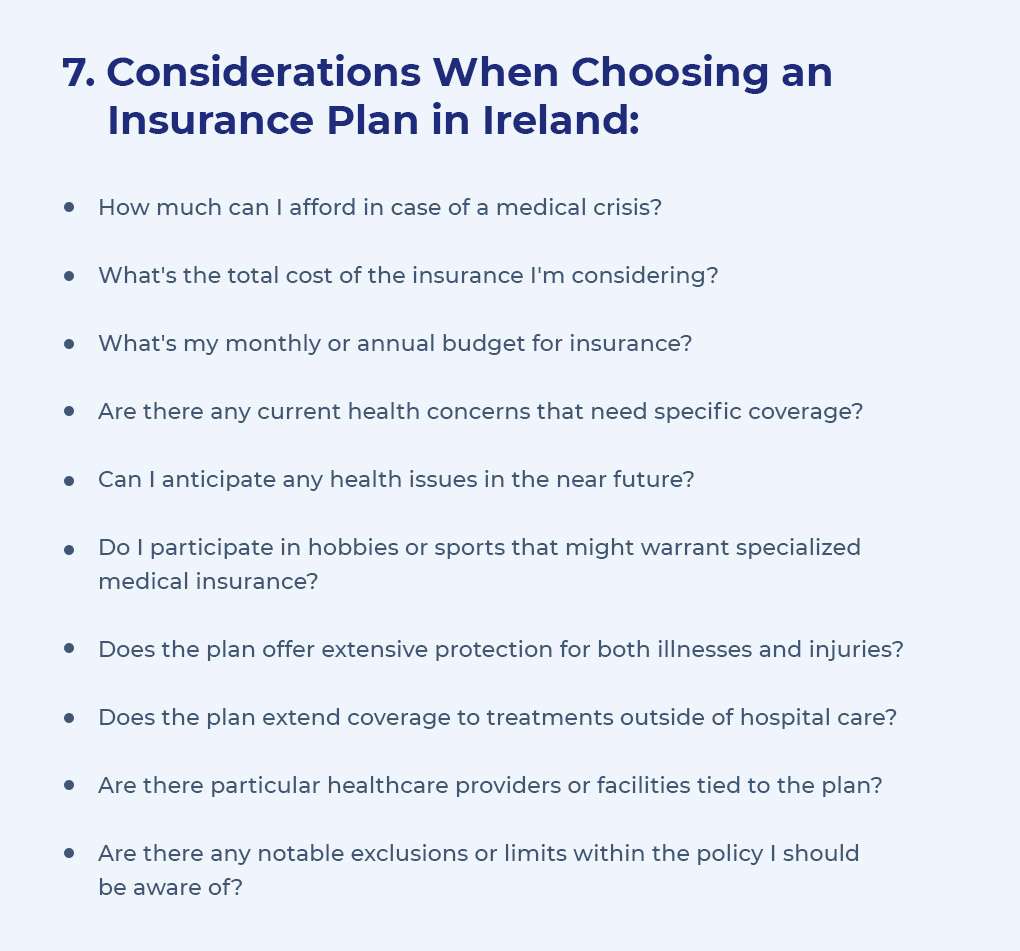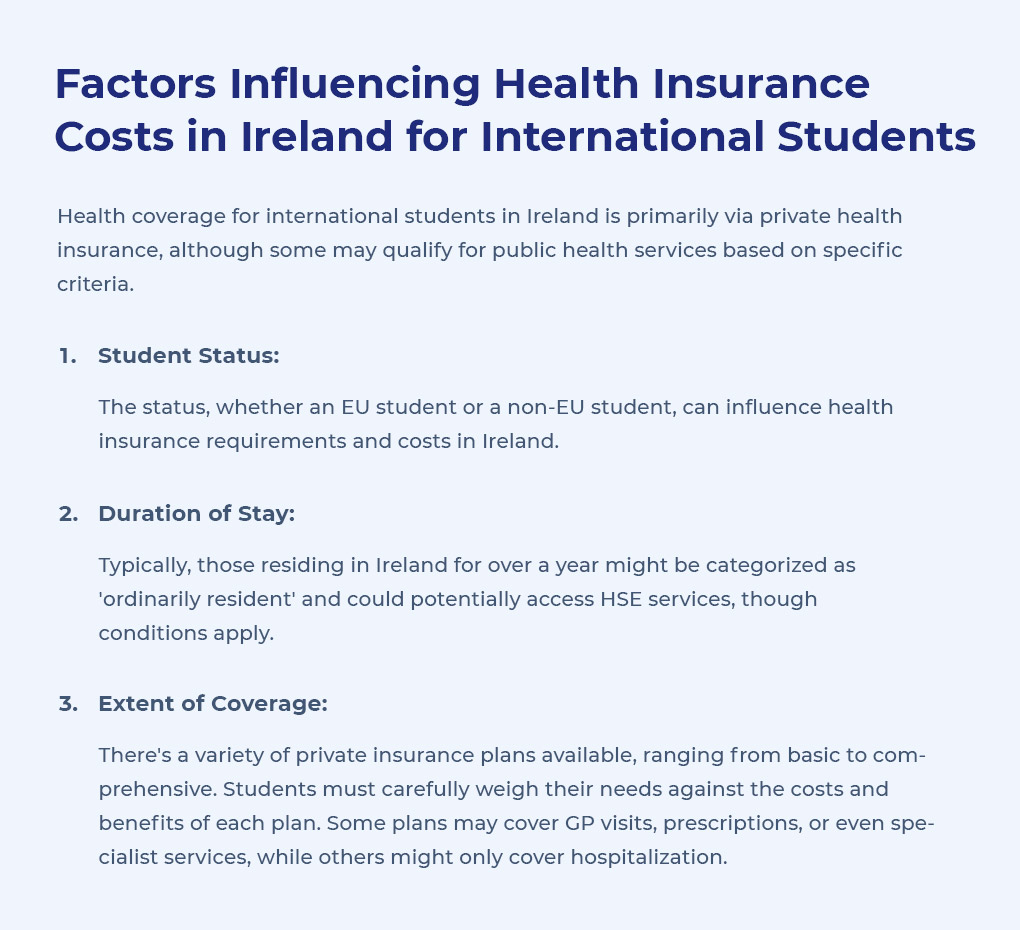

Ireland, known for its lush green landscapes, ancient heritage, and vibrant traditions, stands out as a beacon of excellence in healthcare and wellness. Its health system, which strikes a balance between public and private services, showcases the country's dedication to comprehensive well-being. For international students drawn to the Emerald Isle for their studies, grasping the nuances of this healthcare structure is crucial. This blog delves into the medical and healthcare services that international students in Ireland can avail themselves of during their academic sojourn.
In this blog we will cover the following 17 topics:
In Ireland, a mix of public and private healthcare services ensures that residents receive necessary medical attention. The government, through taxpayer contributions, primarily funds public health services, making many of them available either for free or at a reduced fee. The Health Service Executive (HSE) oversees the delivery and management of public health and social care services in the country.
Eligibility for health services in Ireland is primarily based on residency and means, resulting in two categories: medical card holders and non-medical card holders. Medical card holders can access a wide range of services without charges, including GP visits, while non-card holders may have to pay for certain services.
The country's unique structure means that while many receive free GP services due to the medical card, others might pay a fee when visiting general practitioners. Similarly, while prescription medications are provided at a capped monthly cost for medical card holders, others pay the prescribed retail price.
Hospitals in Ireland operate on a two-tier system: public and private. Patients in public hospitals, funded by the HSE, might receive treatments for free or at subsidized rates, while those opting for private facilities bear higher costs.
Additional healthcare services, like dental or eye care, might have varying charges, with some benefits provided to medical card holders. For instance, while basic dental check-ups might be covered, specialized treatments could come at an additional cost.
In Ireland, while the country offers a robust public healthcare system, international students are typically required to have private medical insurance as part of their visa conditions. This rule ensures that students can access medical care without placing undue stress on the public healthcare system.
Depending on the duration and type of course, international students might be automatically covered under an insurance scheme organized by their educational institution. This insurance primarily deals with accidents or injuries. However, it might not cater comprehensively to illnesses. Hence, many students opt for additional private health insurance to ensure a broader range of medical concerns are covered.
The exact details and costs of these insurance policies can vary depending on the provider and the chosen coverage.
Typically, an annual premium for health insurance for international students in Ireland can range between €500 to €1,000, but this is subject to fluctuations based on individual circumstances and coverage requirements.
While the insurance often covers standard medical needs, students are advised to carefully review their chosen plan to ensure it adequately caters to their specific requirements. Plans are generally valid for a year and may need renewal based on the terms stipulated by the insurer.
It's essential to note that without proper health insurance, international students can face hefty medical bills.
For instance, while a standard GP visit might cost around €50-€60 without insurance, hospital treatments can significantly escalate costs. Emergency department fees, without a GP referral, can be around €100, and private hospital stays can be substantially higher.
Therefore, it's crucial for international students in Ireland to be well-informed about their health insurance requirements and the potential medical costs they might incur if they are not adequately insured.
Before diving in, it's vital to grasp the eligibility criteria for availing health services curated for international students in Ireland:
• Type of Institution: In Ireland, for international students to be eligible for certain health services or institution-based health insurance packages, they typically must be registered at recognized educational establishments. This includes prominent universities and colleges that might have arrangements for their health clinics or bespoke insurance plans.
• Health Services Executive (HSE): Ireland’s national health service, the HSE, administers public health services. Some international students might qualify for public health services through the HSE, especially if they've been in the country for a considerable period.
The HSE's medical card scheme, for instance, might be accessible for students based on their income and certain other factors, ensuring reduced health costs.
In Ireland, while there are public health services, not all treatments are fully covered for non-residents, including international students. It's often recommended that international students secure private health insurance to guarantee comprehensive coverage. Some might be automatically covered under their institution’s group scheme, while others may have to seek individual coverage.
Given the configuration of the Irish health care system, having a form of health insurance is critical. This helps in bridging the gap between public health service limitations and potential medical needs of non-resident students.
International students residing in Ireland can choose from various health insurance options:
Premium: The fee required to maintain and avail of the insurance coverage.
Deductible: This denotes the portion of any claim that is not covered by the insurance provider. The insured party must pay this amount before the insurance benefits begin.
Excess: Often used in Irish insurance parlance, this is similar to 'deductible' in other countries. It's the first portion of each and every claim that the insured pays.
Co-Pay: This refers to a fixed sum the policyholder must pay for a particular medical service, with the insurer paying the remainder.
Expenses: These relate to the charges associated with different health services – from hospital stays, surgeries, prescription medications, to laboratory tests. The specifics of these expenses are outlined in each insurance policy.

International students setting their academic goals in Ireland have several health insurance choices to consider. Here's a breakdown of the health insurance avenues available to international students in Ireland:
With the array of health insurance plans available, international students in Ireland must evaluate their specific circumstances, the length of their stay, and any university or national requirements before zeroing in on the most apt insurance coverage.
When qualifying and registering for a student health plan in Ireland:

Even with an Irish student health insurance plan, it's not a given that every medical service will be covered. Certain services or treatments might fall outside of the insurance umbrella. For instance:
It's of paramount importance for students in Ireland to thoroughly scrutinize the particulars and any potential exclusions of their selected insurance policy. This ensures that they're adequately equipped to address their health requirements or any unforeseen medical emergencies.
Ireland's health insurance structure operates through a combination of public and private systems. The Health Service Executive (HSE) manages public health and social care services in Ireland. Simultaneously, there's a robust private health insurance market for individuals seeking more extensive or quicker access to healthcare services.

In Ireland, the healthcare system operates on a mix of public and private services. The approach to health coverage for international students is more focused on private health insurance, as not all international students qualify for public health services. The cost of health insurance for international students in Ireland varies based on the insurance provider and the level of coverage chosen.
On average, health insurance for international students in Ireland can range from €400 to €1,200 annually. These numbers are approximate and can vary significantly depending on the extent of coverage and any additional benefits the student may opt for.
Ireland encourages international students to have at least a basic health insurance coverage, either through a private insurer or a policy from their home country, which is recognized in Ireland. For Non-EU students, possessing health insurance is typically a mandatory requirement for visa purposes.
It's worth noting that EU students might be able to access certain public health services in Ireland if they possess a European Health Insurance Card (EHIC), although it's still advisable to have additional private insurance for more comprehensive coverage.
Given the dual nature of the Irish healthcare system, international students need to carefully evaluate their health insurance options. They should ensure they are appropriately covered for the duration of their studies, keeping in mind potential medical emergencies, regular health check-ups, and any other unforeseen health issues.
Most Irish universities and institutions of higher learning have health centres on campus. These centres primarily cater to the healthcare needs of students, including routine medical consultations, treatment for minor illnesses, and preventive care. For international students, these centres often serve as the first point of contact for health-related concerns. For more intricate medical issues, these centres may provide referrals to external health practitioners.

While Ireland boasts a mix of public and private healthcare, the availability of private healthcare specialists ensures comprehensive medical attention. If a student requires specialist intervention or desires a second opinion, referrals can be sought from the campus health centres or general practitioners. Before approaching private specialists, students should confirm whether their health insurance policy covers such visits.
For emergencies, Ireland has an extensive network of public and private hospitals equipped with emergency departments. Even though many public healthcare services are available, understanding one's insurance coverage is imperative for international students to avoid unexpected costs.
Pharmacies are widespread across Ireland, with both major chains and independent establishments available. Students can avail prescribed medications from these outlets. However, it's essential to note that even if general practitioner visits are covered under health insurance, prescription medications might not always be fully covered.

Understanding the pressures of academic and life transitions, many Irish universities offer mental health resources. This includes counselling and support services. Some of these services are provided free or at a reduced rate for students. Furthermore, various national helplines and community support groups address mental health needs in Ireland.
Dental and vision services in Ireland, similar to many countries, are not always part of standard health coverage. It's recommended that international students consider supplementary insurance or plans that include dental and vision care to avoid unexpected costs.
International students can benefit immensely by regularly liaising with their university's health services department. This will keep them informed about any changes in healthcare policies, how to efficiently use available services, and stay abreast of any health advisories, particularly in response to global health scenarios.

In conclusion, studying in Ireland offers international students a rich tapestry of experiences. By prioritizing their health, both mental and physical, students can ensure they make the most of their time in the Emerald Isle. Cheers to a healthy and fulfilling study abroad experience!

Studying abroad is an exciting and life-changing experience that offers students a chance to gain a global perspective and valuable exposure ...

In our rapidly globalizing world, where boundaries are melting away and opportunities abound, proficiency in the English language has become ...

Choosing to pursue higher education abroad is an exciting and life-changing decision. Among the plethora of options available to internationa...

Studying abroad is a life-altering adventure that opens doors to new cultures, experiences, and opportunities. Among the plethora of global s...

Australia, renowned for its world-class education and diverse cultural experiences, continues to be a favoured destination for international ...

Australia is not just famous for its iconic Sydney Opera House, the Great Barrier Reef, and its unique wildlife; it is also recognized global...

Studying abroad is a life-changing decision, and with so many options available, it can be overwhelming to choose the right country and univers...

As of March 2022, Australia has seen a consistent rise in its international student numbers, with enrolments reaching 440,219. This marks an ...